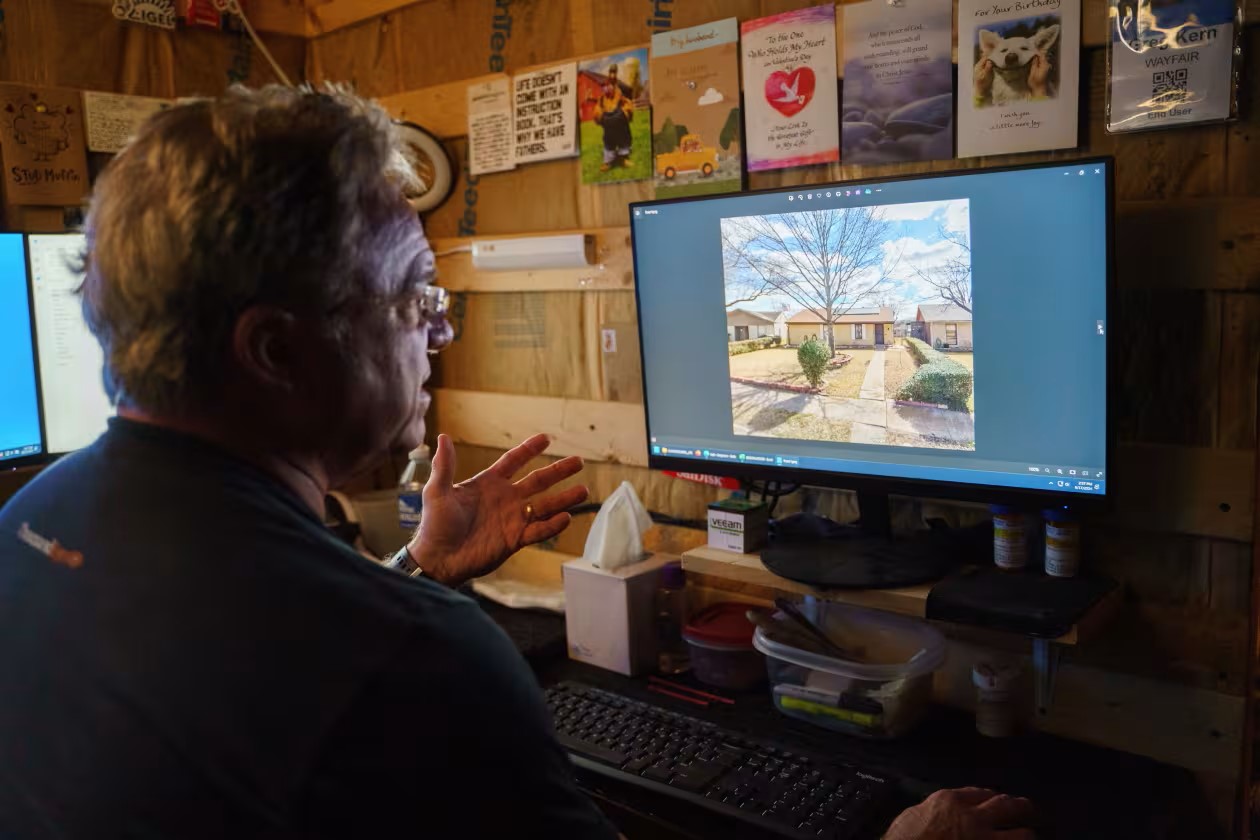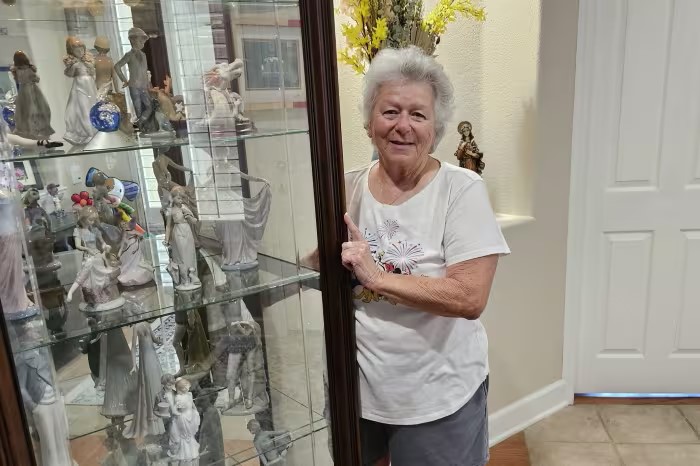
Greg Kern with one of the many boxes of paperwork he had to sort through as administrator of his father-in-law’s estate.
Grief, Then Paperwork: The Messy, Thankless Job of an Estate Executor
After relatives die, there is a tedious, messy process of managing what they leave behind. Relationships can suffer in the aftermath.
The person designated to handle the estate—typically the executor named in the will—must determine what someone owned and owed, pay creditors and taxes, and distribute assets to heirs.
The job is often unwelcome, and sometimes comes as a surprise.
When Greg Kern agreed to handle his father-in-law’s $430,000 estate last fall, he didn’t expect to spend 200-plus hours on it, or that there would be family drama over the house.
There are “still some raw feelings,” he said. “I didn’t know what I was in for.”
Many Americans underestimate the expense and time required. Often a lawyer is needed or a court has to oversee the process, which can cost thousands of dollars and take months or even years. If there is no will, extra costs and delays are common.
The job nobody wants
Kern, a systems engineer in St. Louis, wasn’t named as his father-in-law’s executor. He only stepped in after his wife and her sister told him it was the deathbed wish of their father, Louis Serrata, whose wife of 57 years had also just died.
Serrata’s will had named other people as executors. They agreed to step down upon learning Serrata wanted Kern to be in charge. A court appointed him administrator.
In many cases, estate lawyers said, people named as executors don’t want the job, or decline it.
“It happens all the time,” said Roy Kiecke, an estate lawyer in Austin, Texas. “Mom and Dad come in and don’t want to name one of the kids, so they appoint brother Bob, and he goes, ‘Huh?’ ”
He recommends that people writing their wills ensure their named executors are up to the job—and revisit the choice every few years.
Naming a family member feels natural, but a grief-stricken relative might not be able to cope with the task. Picking one child can lead to resentment from siblings, while having co-executors can result in stalemates.
“If you’re hesitant, then that probably means that’s not the right person,” said Chasity Sharp Grice, an estate lawyer in Memphis, Tenn.
Especially in situations where conflict between heirs is likely, it is better to choose an impartial third party, such as a friend, lawyer or accountant, estate lawyers said.
The hard work of estate distribution
Kern’s father-in-law, a mechanic who worked on UPS trucks, died in September at age 77. He left behind a one-story brick house, 16 financial accounts, jars of old coins and personal items such as an antique pocket watch earmarked for Kern.
The will mandated the sale of the house, with proceeds going to Serrata’s four adult grandchildren. Kern said one had moved into the house. During a family meeting shortly after Christmas, he gave her 90 days to leave.
“It took me a while to stand up and say, ‘I’m the boss here,’ ” he said.
Chasing down the paperwork required to close out Serrata’s financial accounts was the most trying part of Kern’s job. Kern had to haul several boxes of documents in his Volvo SUV from his father-in-law’s Texas home to his residence in Missouri, then sort information on an Excel spreadsheet.
Particularly complicated was closing out a retirement account in his mother-in-law’s name, which required a medallion signature—a special certificate proving one’s identity—and a letter from the estate attorney.
Kern still has to file a last income-tax return, transfer UPS stock to Serrata’s daughters, and go through the coin jars, hoping for a valuable find.
When there is no will
Absent a will, things get more complicated and can take longer—especially when unexpected events occur.
Pat Kayajanian, a retired defense lawyer, died in Lake Balboa, Calif., at age 80 in May 2022. Her stepdaughter, Dottie Robinson, had been managing her care and finances in her later years, but Kayajanian never got around to writing a will and naming an executor.
Robinson arranged the funeral and took inventory of the nearly $200,000 estate. But under California law, other relatives were in line before her to handle the estate. As a stepchild, she also had no right to inherit.
So she helped Kayajanian’s children, her stepbrother and stepsister, from the sidelines.
“They’re family,” she said. “They needed help.”
During the process, her stepsister died suddenly and her stepbrother assumed responsibility for administering the estate. It took until this April, nearly two years after Kayajanian’s death, for the court to sign off on everything.
Robinson said she was grateful Kayajanian had added her name to a checking account. She used it to pay the $1,500 funeral costs and a $1,750 fee from the concierge probate service Trust & Will. She kept the account’s $446 balance.
“It shouldn’t always be about getting paid,” Robinson said. “You don’t have to always get something to do something.”
Complications with heirs
After Violet Shockley died last year at age 94, the hardest job for her estate executor was finding the heirs.
Shockley left her house in Hazel Green, Ala., to a friend. Everything else—investment accounts worth less than $100,000—was to go to surviving siblings of Shockley and her late husband. The problem was that the executor, Shockley’s niece Kellie Wright, didn’t know them all. She hired an estate lawyer to help track them down.
“We had to prove that people were alive and people were dead,” she said.
One brother had died decades ago, and his family didn’t inherit anything. Another was found and will get a fifth of the money.
There are also complications when minors stand to inherit.
When there are minor children and there is no will, Texas law doesn’t assume the surviving spouse is the best person to administer the estate. A court appoints an outside attorney to determine whether that person is up to the job, which can take five or six months, according to Kiecke, the Texas estate lawyer.
One of his clients, Charlotte Sanders, had to navigate that with her two teenage children after her 48-year-old husband died of pneumonia in January. She thought they had done estate planning, but she couldn’t find a will or trust.
“What do you mean! I’m their mother! That’s just crazy!” she recalled thinking when Kiecke told her about the process.
She is cut off from money that was in her husband’s name until she is named administrator. She said she is lucky she has her own bank account and credit card.
Once she is appointed, she will have to post bond—money held back to essentially guarantee she is doing the job right—and submit accounting statements to the court.
“It’s micromanaging,” Kiecke said, all in the interest of protecting the children. Court supervision ends when they turn 18.
Just getting the process started has been a struggle, Sanders said. “You can ignore it, but only for so long. I feel like six months later I’m coming out of the fog.”
Original Article: Ashlea Ebeling, Grief, Then Paperwork: The Messy, Thankless Job of an Estate Executor





